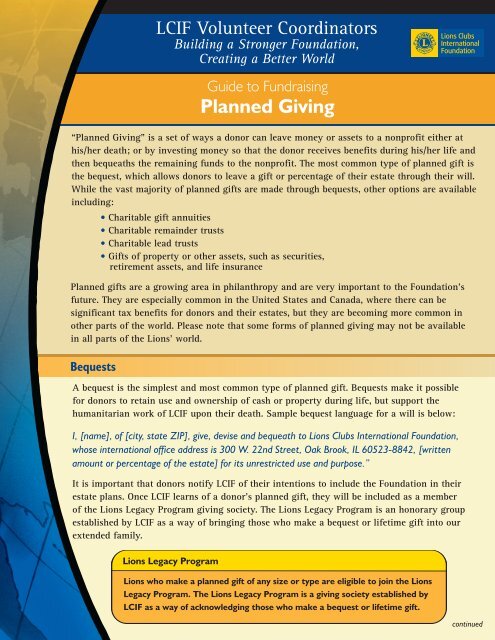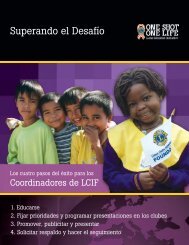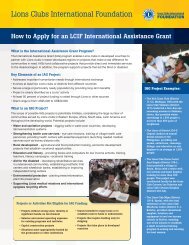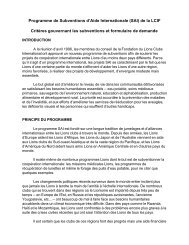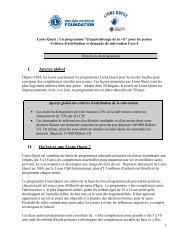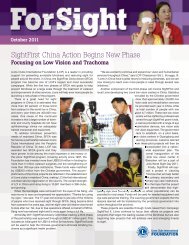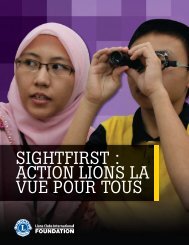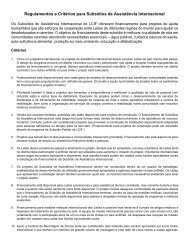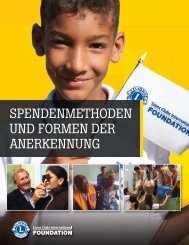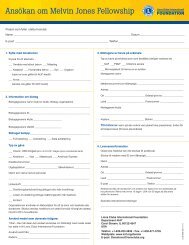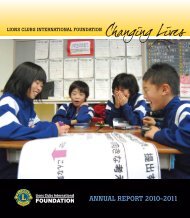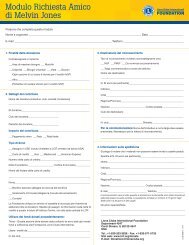Guide to Fundraising: Planned Giving - LCIF
Guide to Fundraising: Planned Giving - LCIF
Guide to Fundraising: Planned Giving - LCIF
Create successful ePaper yourself
Turn your PDF publications into a flip-book with our unique Google optimized e-Paper software.
<strong>LCIF</strong> Volunteer Coordina<strong>to</strong>rs<br />
Building a Stronger Foundation,<br />
Creating a Better World<br />
<strong>Guide</strong> <strong>to</strong> <strong>Fundraising</strong><br />
<strong>Planned</strong> <strong>Giving</strong><br />
“<strong>Planned</strong> <strong>Giving</strong>” is a set of ways a donor can leave money or assets <strong>to</strong> a nonprofit either at<br />
his/her death; or by investing money so that the donor receives benefits during his/her life and<br />
then bequeaths the remaining funds <strong>to</strong> the nonprofit. The most common type of planned gift is<br />
the bequest, which allows donors <strong>to</strong> leave a gift or percentage of their estate through their will.<br />
While the vast majority of planned gifts are made through bequests, other options are available<br />
including:<br />
• Charitable gift annuities<br />
• Charitable remainder trusts<br />
• Charitable lead trusts<br />
• Gifts of property or other assets, such as securities,<br />
retirement assets, and life insurance<br />
<strong>Planned</strong> gifts are a growing area in philanthropy and are very important <strong>to</strong> the Foundation’s<br />
future. They are especially common in the United States and Canada, where there can be<br />
significant tax benefits for donors and their estates, but they are becoming more common in<br />
other parts of the world. Please note that some forms of planned giving may not be available<br />
in all parts of the Lions’ world.<br />
Bequests<br />
A bequest is the simplest and most common type of planned gift. Bequests make it possible<br />
for donors <strong>to</strong> retain use and ownership of cash or property during life, but support the<br />
humanitarian work of <strong>LCIF</strong> upon their death. Sample bequest language for a will is below:<br />
I, [name], of [city, state ZIP], give, devise and bequeath <strong>to</strong> Lions Clubs International Foundation,<br />
whose international office address is 300 W. 22nd Street, Oak Brook, IL 60523-8842, [written<br />
amount or percentage of the estate] for its unrestricted use and purpose.”<br />
It is important that donors notify <strong>LCIF</strong> of their intentions <strong>to</strong> include the Foundation in their<br />
estate plans. Once <strong>LCIF</strong> learns of a donor's planned gift, they will be included as a member<br />
of the Lions Legacy Program giving society. The Lions Legacy Program is an honorary group<br />
established by <strong>LCIF</strong> as a way of bringing those who make a bequest or lifetime gift in<strong>to</strong> our<br />
extended family.<br />
Lions Legacy Program<br />
Lions who make a planned gift of any size or type are eligible <strong>to</strong> join the Lions<br />
Legacy Program. The Lions Legacy Program is a giving society established by<br />
<strong>LCIF</strong> as a way of acknowledging those who make a bequest or lifetime gift.<br />
continued
<strong>Guide</strong> <strong>to</strong> <strong>Fundraising</strong> <strong>Planned</strong> <strong>Giving</strong> continued<br />
In addition <strong>to</strong> bequests, several other planned giving options are available:<br />
Charitable gift annuities: A gift annuity is an agreement through which a donor makes a gift of cash,<br />
property or other assets and a nonprofit agrees <strong>to</strong> make fixed payments <strong>to</strong> the donor for their lifetime.<br />
Charitable remainder trusts: A charitable remainder trust is funded by cash or property from a donor.<br />
The donor received an income stream for life (or a specified term). The nonprofit receives the remainder<br />
of the trust upon death or at the end of the term.<br />
Charitable lead trusts: A charitable lead trust is funded by cash or property from a donor and makes<br />
payments <strong>to</strong> a nonprofit for a specified term. At the end of the term, the remainder of the trust is<br />
distributed <strong>to</strong> a specified beneficiary, usually family.<br />
<strong>LCIF</strong> Development staff is available <strong>to</strong> help guide the best strategy for planned giving and <strong>to</strong> address<br />
specific donor questions and concerns. These staff members can provide you with additional <strong>to</strong>ols<br />
and specific directions <strong>to</strong> aid you in this process.<br />
The most important way <strong>to</strong> promote planned giving is <strong>to</strong> let your fellow Lions know that several<br />
options are available. In many cases, planned gifts allow donors <strong>to</strong> have a greater impact on the<br />
work of the Foundation than would otherwise be possible.<br />
When talking <strong>to</strong> Lions about planned gifts, keep the following in mind:<br />
1. Encourage Lions interested in planned giving <strong>to</strong> consult an expert.<br />
Estate and tax laws and procedures vary significantly throughout the Lions’ world, so it is very important<br />
<strong>to</strong> advise any Lion wishing <strong>to</strong> make a planned gift <strong>to</strong> consult an at<strong>to</strong>rney, financial advisor, or other expert.<br />
There are also different types of bequests and other planned gifts, so it is important that the donor<br />
understand the available options.<br />
2. Ask Lions interested in making a bequest or other planned gift <strong>to</strong> contact foundation staff.<br />
It is important for <strong>LCIF</strong> <strong>to</strong> be aware of any planned gifts so that Foundation staff can take appropriate<br />
follow-up measures. Donors making planned gifts are also eligible for special recognition through the<br />
Lions Legacy Program.<br />
3. Remember that there is planned giving potential at all levels.<br />
Keep in mind that even small planned gifts are important <strong>to</strong> the Foundation. A donor does not need<br />
<strong>to</strong> be wealthy in order <strong>to</strong> make a planned gift. Encourage every Lion <strong>to</strong> think about estate planning<br />
and <strong>to</strong> make a will.<br />
www.<strong>LCIF</strong>.org/plannedgiving<br />
<strong>LCIF</strong> Development<br />
300 W. 22nd Street • Oak Brook, IL 60523 USA<br />
Tel: 630-203-3797 • Web site: www.lcif.org<br />
E-mail: lcifdevelopment@lionsclubs.org<br />
<strong>LCIF</strong> 617 EN


